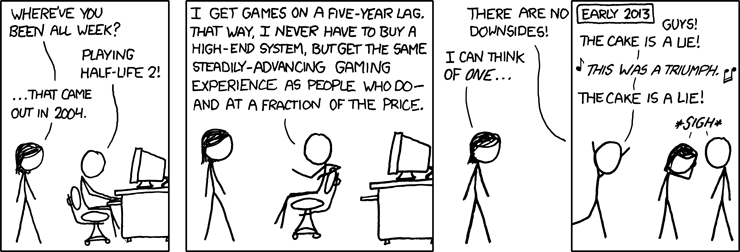Fallout: New Vegas

I’ve been dealing with some issues over the past few months that have prevented me from being as physically active as I would like to be. So a couple weeks ago I decided to embrace it and purchased a “new” game I could play on the computer, Fallout: New Vegas. I had read a lot of good things about the game and I wasn’t disappointed.
Right out of the gate, I was engaged in the story. Essentially the premise being that your character suffers severe amnesia after being shot therefore providing a solid premise for the initial setup of your character. You start with a fairly mundane selection of points allocated to strength, intelligence, etc. but then a nice touch comes when the doctor character guiding you through the setup gives you essentially a psychiatric evaluation to help assign initial skill points. This is where I really started to be impressed because it was such a unique way to guide you through what is normally a pretty mundane, number-crunching process. So from the very beginning you are provided with a reasonable footing for the character being a reflection of yourself.
After this, you are set loose into the town of Goodsprings located in the Mojave desert and devastated by the fallout of a global, nuclear war. Having not experienced this type of environment the early parts of the game at least seem pretty realistic. Starting out you learn some basic skills so you can survive and while there are choices you can make regarding helping other people out or not, you are mostly just struggling to survive. This is a key element of the game, there is a multitude of paths you can take in terms of helping, hurting, or avoiding people and groups. The game will maintain your status with each group from idolized to villified and everything in between. Since most people you encounter are already established in the world you try not to make them angry because nearly everyone is a part of a community where weapons are readily available and as a low level character you are just not ready to be a one-man army in this world. So you play nice and survive as you explore and learn about the world you have entered.
The world of Fallout, New Vegas is not a clean slate. Everywhere you go people have stories to tell and there are journals or emails at computer terminals that can be read. Each of these provides a snippet of a localized story that fits into the overall world. It adds real depth to the environment your character inhabits.
As your character gets stronger and you discover more deadly weaponry, your options to refuse to help or even enter direct conflict with other people/groups become wider since you are capable of holding your own. This is where I have found the game to be truly interesting because you are faced with moral dilemmas to which the game provides no guidance as to which choice is correct. The assumption that you are one of the good guys fighting against the bad guys does not exist in this game since you can join any faction you would like and with the exception of the legion are just reasonable people trying to survive in the wasteland. As I’ve thought about parts that I have played through so far I have found myself questioning or being surprised at the choices I made in the game after thinking through the choices in a more comprehensive manner. The game does an excellent job at presenting dilemmas that, like the real world, are not cleanly black and white.
One such decision that gave me pause was dealing with the mysterious Mr. House. He controls the Vegas strip with an army of powerful robots and you are told that he goes to great lengths to manipulate the other factions in the area to maintain his control. His character initially rubbed me the wrong way for some reason and eventually my character became powerful enough to kill Mr. House and take over his robots. After doing this it occurred to me that while Mr. House did maintain absolute control over the Vegas strip and was extremely manipulative he was providing protection for everyone in the strip and had even struck something of a tenuous alliance with the semi-democratic government faction. My decision was interesting to me because my motivations seemed to be that I could be a more benevolent Mr. House, yet my disgust with Mr. House was mostly due to his totalitarian rule where his and only his opinion matters. What is my character effectively doing? Trying to play nice with all of the factions I can so that I alone can determine which factions should win or lose.
Now admittedly, it is a game and so some of these decisions are made quickly just to progress the story. This doesn’t diminish the engaging world the game creates and the immense breadth of paths you can choose to take through the world.